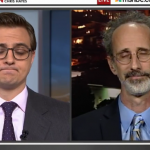Peter Gleick
As readers of this column may already know, earlier this week the Pacific Institute and I announced an important and exciting change: on July 1st after 28 years as co-founder and President of the Institute, I will be moving to a new position as President Emeritus and Chief Scientist. A wide search for a new president has been launched.
I’m neither resigning nor retiring. In my new role, I will continue to do research and writing on global climate, water, and sustainability issues, and I will continue to speak out on science and policy issues in public forums, with the press, and on…
The latest episode of Ikonokast, the science podcast Mike Haubrich and I do, is now up. This is an interview with Pacific Institute's Peter Gleick. We talk about the California drought (past, present, and future), Syria, virtual water, El Nino and climate science denialism.
You can hear the podcast here: WHAT ABOUT WATER? DR. PETER GLEICK OF THE PACIFIC INSTITUTE.
California’s hottest and driest drought in recorded history has shifted the sources of electricity with adverse economic and environmental consequences. The Pacific Institute has just completed and released a report that evaluates how diminished river flows have resulted in less hydroelectricity, more expensive electricity from the combustion of natural gas, and increased production of greenhouse gas emissions.
The current severe drought has many negative consequences. One of them that receives little attention is how the drought has fundamentally changed the way our electricity is produced.…
In a new study just published by the journal Sustainability Science (Springer), analysis from the Pacific Institute (with lead author Dr. Juliet Christian-Smith, now at the Union of Concerned Scientists) shows that many of the fundamental responses of California water users to severe drought actually make the state’s overall water conditions worse – that in the end, many of these actions are “maladaptations.”
Water is a complex resource; and water problems are an equally complex mix of natural resource, technology, social, economic, and political conditions. When water is limited,…
Last month, listening to NPR, I learned that Sacramento, California is struggling with the installation of water meters on homes. There were two things I learned, both ungood: 1) Sacramento was installing water meters on homes, meaning, that they hadn't been there all along. I found that astounding because water meters are the first line of defense in controlling water use. Charge people for the water and they'll pay attention to the drippy faucet, they'll be more likely to remember to turn off the sprinkler, maybe they'll think about investing in more efficient water-using appliances. Or…
Possibly both.
Climate change certainly has a huge effect. Increased evaporation, decreased snowpack, the stalling of air masses that cause more drying and less wetting, which in turn is caused by changes in the jet stream, which in turn is caused by "Arctic Amplification," an effect of global warming, are major causes of a three year drought coming hard on the heels of a decade of near-drought dry.
But also, Californian approaches to water management have been an issue. I recently learned that there are communities in California that don't even have water meters on people's houses. What…
So it is about one year ago that Peter Gleick exposed the too-ashamed-to-admit-it donors of the science denialist industry flack Heartland Organization. Michael Tobis has a very comprehensive run-down and analysis of the event over on P3, I recommend it, especially if you need to get up to speed on what I am talking about.
My only comment on the whole morality play aspect of it is that the question "do the ends justify the means" does not have a one size fits all answer. I have always been a bit puzzled by the seemingly unquestioned moral hammer that question gets used as. …
Peter Gleick, my sbling here at scienceblogs.com (see his blog here) is famous for a lot of things, but about one year ago he went up against the Heartland Institute and in a daring effort of investigative (if avocational) journalism, revealed that right wing conservative/libertarian "think" tank's nefarious plans to interfere with science education in an effort to discredit climate scientists in the eyes of the American public and our students through a series of rather smarmy tactics, including some really obnoxious billboards.
Scott Mandia at "Global Warming: Man or Myth?" has written a…
Peter Gleick has been reinstated in his position as president of the Pacific Institute.
The Pacific Institute is pleased to welcome Dr. Peter Gleick back to his position as president of the Institute. An independent review conducted by outside counsel on behalf of the Institute has supported what Dr. Gleick has stated publicly regarding his interaction with the Heartland Institute. This independent investigation has further confirmed and the Pacific Institute is satisfied that none of its staff knew of or was involved in any way.
Dr. Gleick has apologized publicly for his actions, which are…
Peter Gleick has been cleared of faking a key memo. Who is Peter Gleick, and what is this memo of which we speak? Here is a refresher of events over the last 3 1/2 months:
You will recall that last February 14th, we were all given an interesting Valentine's Day present: A cache of documents had been acquired from the Heartland Institute, and these documents revealed important details about Heartland's effort to interfere with science education and otherwise agitate and lobby to promote climate science denialism. The documents were released to the public by an as then unknown activist, and…
So, it turns out that Heartland was behind the Heartland leak after all.
The evidence seems to suggest that Heartland's Joe Bast wrote a memo, then he and/or Heartland-symp blogger Steven Mosher sent it secretly to Peter Gleick. Peter Gleick then obtained additional material from Heartland, which came to him at his request but all to easily to be explained as a mere oversight on the part of some administrative or secretarial staff. The only thing missing here is evidence that Bast or Mosher or someone suggested to Peter that he verify the memo by asking for related documents from…
The best available evidence now suggests that the most damning of the "Heartland Documents" -- the strategy memo which explicitly states that Heartland's strategy is to interfere with good science education in order to advance their political agenda -- is legitimate. The legitimacy of the document was being questioned because it was physically and stylistically different from the other documents with which it was released. We now know that the strategy memo was sent to climate scientist Peter Gleick and that Peter then took steps to acquire corraborating documents from Heartland (see "The…



